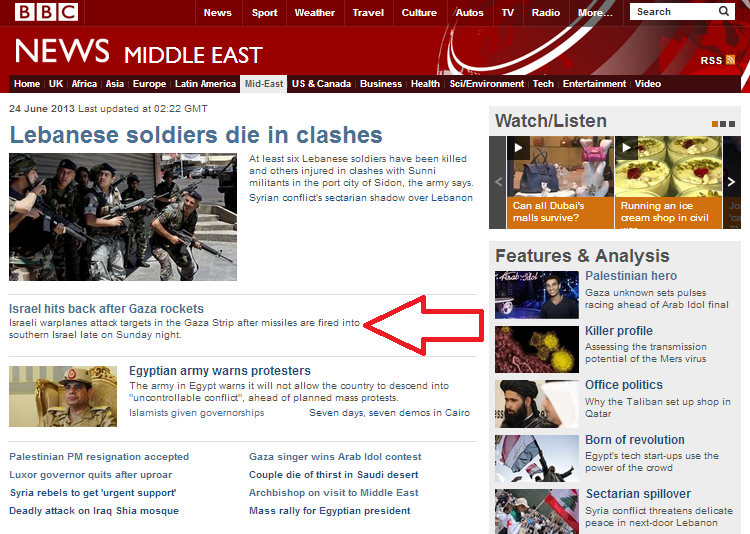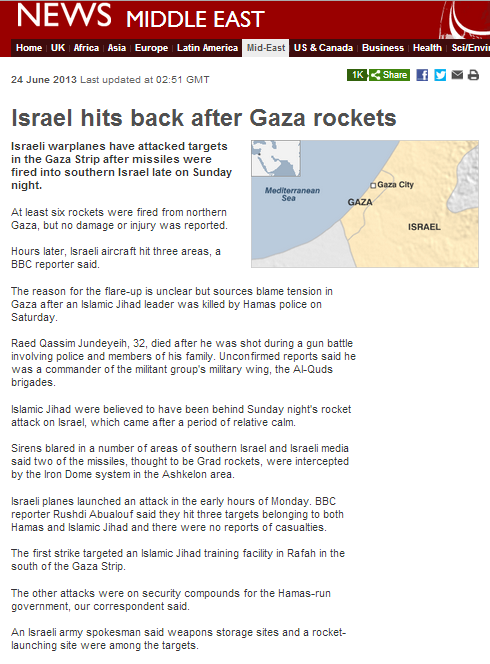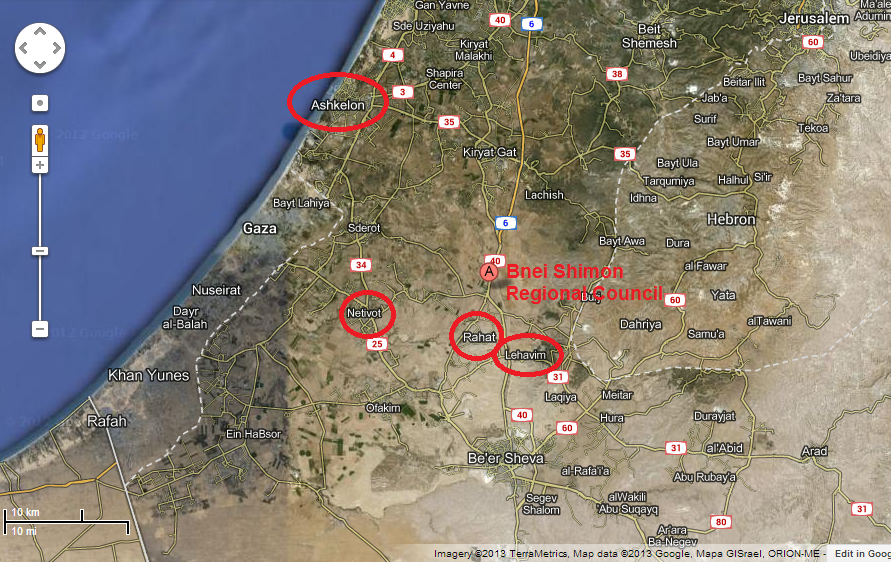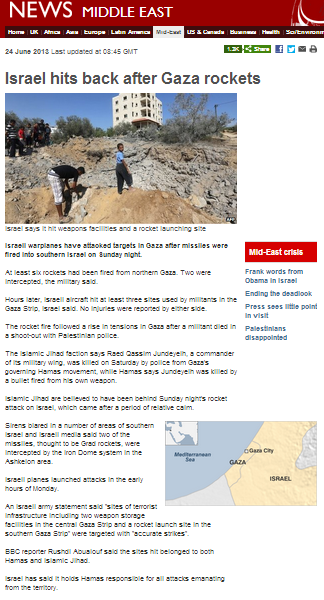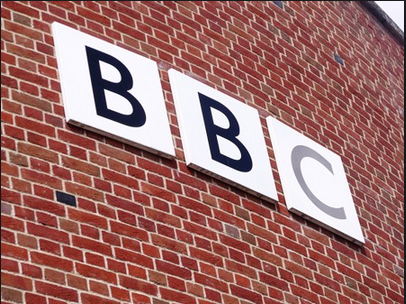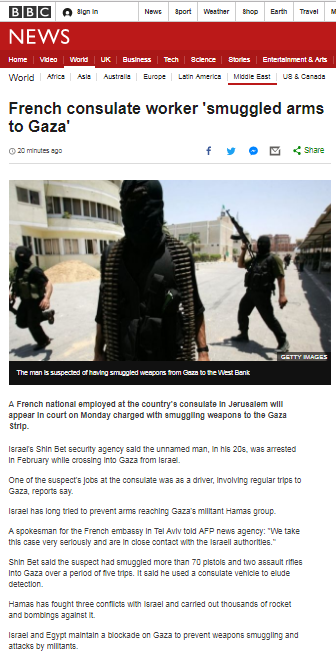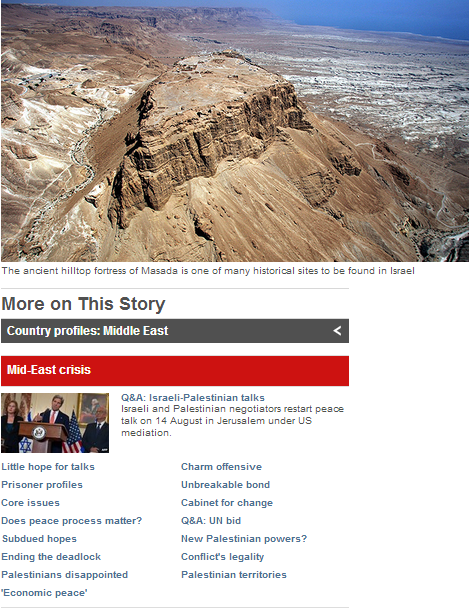Readers of the BBC News website’s Middle East page were informed on June 24th 2013 that “Israel hits back after Gaza rockets”.
The link leads to a report with the same ‘last-first’ headline in which the chronological events of the story are reversed, the earlier version of which is shown below.
That ‘last-first’ theme is repeated in the report’s opening paragraph:
“Israeli warplanes have attacked targets in the Gaza Strip after missiles were fired into southern Israel late on Sunday night.”
In both that and the subsequent paragraph, readers learn that rockets “were fired” by unnamed parties, but no details are provided about where they landed or what their targets were, as though the fact that “no damage or injury was reported” negates the necessity to inform BBC audiences that their targets were actually sleeping civilians in several communities including Ashkelon, Netivot, the Bedouin town of Rahat and in the regional councils Bnei Shimon and Lahavim.
“At least six rockets were fired from northern Gaza, but no damage or injury was reported.”
In the seventh of ten paragraphs the report notes that:
“Sirens blared in a number of areas of southern Israel and Israeli media said two of the missiles, thought to be Grad rockets, were intercepted by the Iron Dome system in the Ashkelon area.”
In contrast to the use of the vague term “were fired”, we find that Israeli actions are described in very different terms and their consequences are reported. [emphasis added]
“Israeli warplanes have attacked targets in the Gaza Strip after missiles were fired into southern Israel late on Sunday night.”
“Hours later, Israeli aircraft hit three areas, a BBC reporter said.”
“Israeli planes launched an attack in the early hours of Monday. BBC reporter Rushdi Abualouf said they hit three targets belonging to both Hamas and Islamic Jihad and there were no reports of casualties.”
“The first strike targeted an Islamic Jihad training facility in Rafah in the south of the Gaza Strip.
The other attacks were on security compounds for the Hamas-run government, our correspondent said.”
So, whilst missiles “were fired” from the Gaza Strip, only once (in paragraph six) are those actions described as an “attack” and readers are not told that they “hit” anything or “targeted” anyone.
Three paragraphs of the report are dedicated to speculations regarding the ‘reasons’ for the missile fire. It is not made clear to readers that the Palestinian Islamic Jihad is an Iranian-backed terrorist organization proscribed by the United States, the European Union, the United Kingdom, Japan, Australia, Canada and Israel. Instead, the BBC uses the misleading and euphemistic term “militant group”.
“The reason for the flare-up is unclear but sources blame tension in Gaza after an Islamic Jihad leader was killed by Hamas police on Saturday.
Raed Qassim Jundeyeih, 32, died after he was shot during a gun battle involving police and members of his family. Unconfirmed reports said he was a commander of the militant group’s military wing, the Al-Quds brigades.
Islamic Jihad were believed to have been behind Sunday night’s rocket attack on Israel, which came after a period of relative calm.”
Having totally ignored the fact that less than only five days previously the residents of Ashkelon were also woken in the early hours of the morning by sirens warning of incoming missiles from the Gaza Strip, the BBC is able to promote the notion of “a period of relative calm”.
Some seven hours after the publication of that report an amended version was posted at the same URL in which the problematic aspects of the original version are repeated.
Significantly, the BBC chooses not to trouble its audiences with the question of why the sleeping residents of Israeli towns should come under missile attack due to a confrontation between two terrorist organisations in a territory from which Israel disengaged eight years ago.
“Islamic Jihad today suspended its contacts with Hamas after police opened fire yesterday on one of the commanders of the Al-Quds Brigades, Raed Jundiya, 38, inflicting serious injuries from which he died this morning,” AFP quoted a leader of the extremist group as saying.
“The murder of Raed Jundiya represents a major service to the Zionist enemy, provided completely free of charge, whether deliberately or not, because the martyr was, as everybody knows, on the top of the Zionists’ hit-list as he headed the Brigades’ rocket unit,” he said.”
Instead, in line with its prevailing narrative, the BBC focuses its audiences’ attentions on the Israeli response to those attacks on its civilians through the use of omission, language and ‘last-first’ reporting.
Related articles:
BBC News: telling the end of a story first
More ‘last-first’ BBC reporting from southern Israel and the Gaza Strip
BBC resumes ‘last-first’ reporting from Gaza area – and then changes tack

